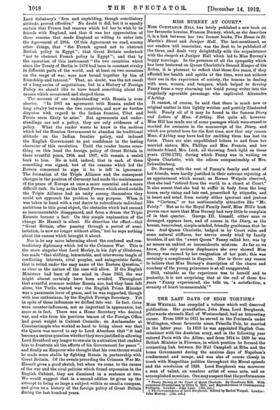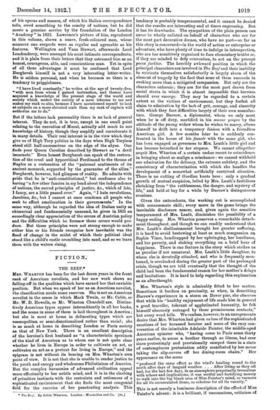THE LAST DAYS OF HIGH TORYISM.t
Miss WEIGALL has compiled a volume which well deserved publication. Her grandfather, John Fans, Lord Burghersh, afterwards eleventh Earl of Westmorland, had an interesting career. From 1809 to 1811 he served in the Peninsula under Wellington, whose favourite niece, Priscilla Pole, he married in the latter year. In 1813 he was appointed English Com- missioner with the Austrian army, and in the following year entered Paris with the Allies ; and from 1814 to 1830 he was British Minister in Florence, in which position he formed the connecting link between Sir Neil Campbell at Elba and the home Government during the anxious days of Napoleon's confinement and escape, and was also of course closely in touch with Neapolitan politics throughout the Murat episode and the revolution of 1820. Lord Burghersh was moreover a man of talent, an amateur artist of some note, and an accomplished musician. One may suspect that the performances Fanny Burney at the Court of Queen Charlotte. By Constance Hill. With numerous Illustrations by Ellen G. Hill, and Reproductions of Contemporary Portraits. London : John Lane. [16s. net.] t The Correspondence of Lord Burghersh. Edited by Rachel Welgalt. London : John Murray. [12s. net.]
of his operas and masses, of which his Italian correspondence tells, owed something to the comity of nations, but he did music a genuine service by the foundation of the London "Academy" in 182-2. Lawrence's picture of him, reproduced in this volume, shows a suave, fresh-coloured man, whose manners one suspects were as regular and agreeable as his features. Wellington and Vane Stewart, afterwards Lord Londonderry, were amongst his most intimate correspondents, and it is plain from their letters that they esteemed him as an honest, courageous, able, and conscientious man. Yet in spite of all these advantages it must be confessed that Lord Burghersh himself is not a very interesting letter-writer. He is seldom personal, and when be becomes so there is a tendency to priggishness.
"I have lived constantly," he writes at the age of twenty-five, with men from whom I gained instruction, and thence have acquired a knowledge of the present stage of the world and society which makes the society of a mess irksome to me and makes my rank so also, because I have accustomed myself to look at subjects on a more elevated scale than my rank of captain will authorize me to do."
But if the letters lack personality there is no lack of general interest. They do not, it is true, except in one small point relating to the execution of Murat, actually add much to our knowledge of history, though they amplify and corroborate it in many details. Their real interest is in the view which they give us of High Tory politics in the days when High Toryism stood still half-unconscious on the edge of the abyss. One finds poor Queen Caroline described by Stewart as "a devil incarnate." Even honest Burghersh can speak of the restora-
tion of the cruel and hypocritical Ferdinand to the throne of Naples as a restoration of the "paternal sentiments of its ancient monarch, supported by the guarantee of the allies." Burghersh, however, had glimpses of reality. He admits with pride that he is " anti-constitutional," but confesses also to having "a few other fancies in my head about the independence of nations, the sacred principles of justice, &c., which of late, I fancy, are a little passed over." Again, " I hate revolutions, Jacobins, &c., but I cannot at once condemn all people who seek to effect amelioration in their governments." In the same way, although he regarded the idea of Italian unity as chimerical and fundamentally unsound, he gives in 1821 an exceedingly clear appreciation of the errors of Austrian policy and the difficulties which he foresaw those errors would pro- duce. But those principles were not strong enough to make either him or his friends recognize how inevitable was the flood of change in the midst of which their political ideal stood like a child's castle crumbling into sand, and so we leave them with the waters rising.



















































 Previous page
Previous page